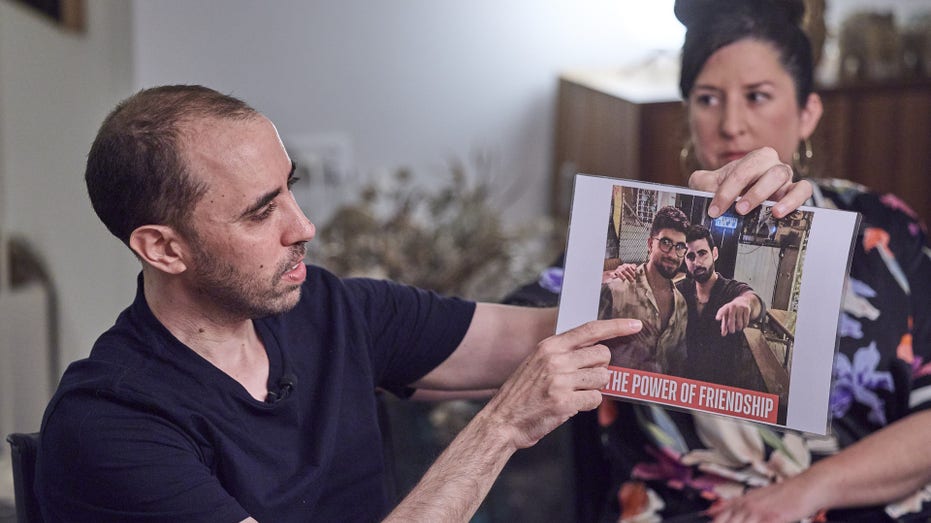Freed Israeli Hostage Shares Harrowing Story of 505 Days Under Hamas Captivity

Sarah Johnson
March 16, 2025
Brief
Tal Shoham breaks his silence after 505 days as a Hamas hostage, detailing his harrowing survival, family separation, and unwavering resilience during captivity in Gaza.
Exclusive: After spending a grueling 505 days in captivity, Tal Shoham has finally broken his silence and shared his extraordinary story of survival and resilience during his time as a hostage of Hamas. Taken from Kibbutz Be’eri on October 7, 2023, Shoham endured unimaginable hardships, including being confined in a suffocating underground tunnel and later moved between various houses in Gaza. His survival, against all odds, is a testament to sheer determination and an unyielding spirit.
During the attack, Shoham surrendered to Hamas terrorists in hopes of saving his family, who were hiding inside their home as gunfire echoed outside. Tragically, he was separated from his wife and two young children, unaware of their fate. His captors subjected him to brutal treatment, shackling him, depriving him of food, and denying basic human comforts. For eight-and-a-half months, he lived underground, followed by five months in different locations within Gaza.
Despite the despair, Shoham held on to his humanity. "I am not a victim," he declared, determined to face even death with dignity. "They won’t break me, and I will not surrender to self-pity. We are stronger than the other side." His words resonate like a battle cry—a reminder of the power of hope even in the darkest of times.
Now home for three weeks, Shoham reflects on the stark contrast between life in Gaza and life in Israel. "Half-an-hour’s drive, two separate worlds," he said. "On one side, cruelty beyond reason. On the other, sanity, dignity, and compassion." This sharp division underscores the surreal nature of his ordeal.
Through the pain, Shoham's focus remains on the two fellow captives still held underground—Evyatar David and Guy Gilboa-Dalal. "I can’t sleep at night knowing they are still there," he confessed, likening his release to being born again. The memory of his captivity is etched in his mind, and his mission now is to raise awareness for those left behind.
Recounting the chilling moments of his abduction, Shoham described surrendering to terrorists who had set fire to neighboring homes, burning the occupants alive. His captors drove him into Gaza, where he endured beatings and public humiliation. "I refused to kneel," he said, standing defiant even as a rifle was pointed at him. "If you want to kill me, kill me, but you will not execute me like ISIS." Such bravery is almost cinematic, but this was no movie—it was raw, real, and horrifying.
The torment didn’t stop. Shoham was paraded through the streets in what Hamas called a "victory march," enduring insults and physical attacks from a mob. For 34 days, he was held alone and shackled in a house, surviving on meager rations like three spoons of avocado or half an orange. But the worst torture was psychological—the uncertainty of his family’s fate. To cope, Shoham imagined their funerals in heartbreaking detail, burying them in his mind to find some semblance of closure.
On the 50th day of captivity, a glimmer of hope emerged—a letter confirming his wife and children were alive and had been released. "The most important thing had happened—my family was safe," he recalled. "Now, I could focus on my war, the one for survival." This revelation fueled his resolve to endure the unimaginable.
By June 2024, Shoham and his fellow captives were moved to an underground tunnel—a claustrophobic space with four mattresses, a single dim lightbulb, and a hole for a toilet. The conditions were brutal, with oxygen deprivation and severe malnutrition taking a toll. At one point, Shoham’s leg turned blue and purple from internal bleeding, and he received dog food-like vitamin supplements to stave off death.
Even in the face of such cruelty, Shoham preserved his humanity. "Among us, the Jewish hostages, there was purity," he said. "The terrorists inflicted whatever horrors they wanted, but within our space, we preserved our inner cleanliness and our dignity. That was crucial to making it out unbroken." These words are both heartbreaking and inspiring—proof that even in hell, humanity can prevail.
Finally, in February 2025, Shoham was named part of a hostage-release deal. When he emerged from the tunnel blindfolded, he felt dew on his skin—a poetic moment, as "Tal" means "dew" in Hebrew. After enduring humiliations in Gaza, he was handed over to the Red Cross and reunited with his wife and children. "It was a dream come true," he said, though grappling with the reality took days.
Shoham’s story is one of survival, loss, and hope. Eleven members of his extended family were kidnapped or murdered in the October 7 attack, but amidst the tragedy, new life emerged—four babies born during his captivity. His tale serves as a powerful reminder of resilience, humanity, and the enduring strength of the human spirit.
Topics
Editor's Comments
Tal Shoham's story is the kind of narrative that leaves you speechless and awe-inspired—his refusal to kneel, even with a rifle aimed at him, is a moment that stands out. It's chilling how close his ordeal reflects a dystopian nightmare, yet his humanity remained intact. The dew moment? It’s almost poetic justice after such a harrowing journey. Let’s hope his voice amplifies the urgency to bring the remaining hostages home.
Like this article? Share it with your friends!
If you find this article interesting, feel free to share it with your friends!
Thank you for your support! Sharing is the greatest encouragement for us.



